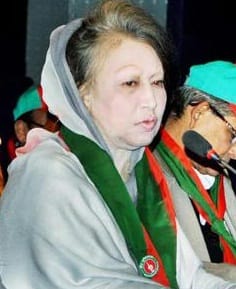Last Updated on February 20, 2025 11:02 pm by INDIAN AWAAZ

Zakir Hossain / Dhaka
Bangladesh’s former premier Khaleda Zia’s Bangladesh Nationalist Party (BNP) has expressed concerns over a possible delay in the national elections, despite assurances from the government that polls will be held by December this year. Senior BNP leaders suspect that certain factions—comprising student leaders of the Anti-Discrimination Movement, Bangladesh Jamaat-e-Islami, and a group within the government—may be working to postpone the election for their own political gains.
Speaking to this correspondent, BNP leaders confirmed that their party remains committed to a peaceful political strategy and will exercise patience to avoid conflicts unless provoked. Given their historically strained relationship with Jamaat-e-Islami, the BNP is now considering the Islamist party as a potential electoral competitor rather than an ally.
BNP is also closely observing the political ambitions of student leaders who played a key role in the recent Anti-Discrimination Movement. A standing committee member, speaking anonymously, stated, “If the students form a political party and step away from their government roles, we will welcome them. However, if they attempt to use state resources and power to strengthen their position, we will not accept it. Such actions could create tensions between us, the students, and the government.” The BNP leader further claimed that a section of the government, influenced by students and Jamaat, is working to extend its hold on power by delaying elections under the pretext of political reforms and local body elections. He alleged that both Jamaat and the student leaders are interested in postponing the elections to consolidate their respective political standings.
“Jamaat believes that the longer the election is delayed, the more BNP’s popularity will decline, creating an opportunity for them to perform better in the polls,” the leader added. In response, BNP is adopting a cautious strategy, balancing its engagement with the government and student leaders while keeping Jamaat at arm’s length. To increase pressure on the government, BNP has already begun holding district-level rallies from February 12 and will host an extended party meeting on February 27 to energize its supporters. The party will also engage in grassroots-level outreach during Ramadan, focusing on mass communication and iftar gatherings, while planning post-Eid demonstrations to keep up momentum.
A BNP leader reaffirmed the party’s commitment to ensuring timely elections. “Our standing committee still trusts the chief adviser’s commitment to hold elections by December. However, we are observing a negative attitude from certain quarters within the government. To counter this, we will intensify our pressure and demand an election roadmap,” he stated. He also emphasized BNP’s strategy to maintain peace and prevent any third party from exploiting political instability. “We want to achieve our demand for elections while upholding the dignity of interim government chief adviser Muhammad Yunus. We will continue to apply pressure but will not take any action that could be perceived as disrespectful to him,” he added.
BNP standing committee member Gayeshwar Chandra Roy reiterated the party’s cooperative approach towards the interim government, stating, “We have supported this government in the hope that it will arrange a credible election. The government should not create a situation where people are compelled to take to the streets in a fierce movement to demand elections.” He further warned, “We brought this government in with respect, and we want to see it off with respect. It must fulfill its responsibility of holding the election on time.” Another senior BNP leader, Iqbal Hasan Mahmud, called on the government to immediately announce an election roadmap. “The people have entrusted this government with the task of restoring democracy through a free and fair election. Instead of engaging in delay tactics, they should fulfill their duty,” he said.
